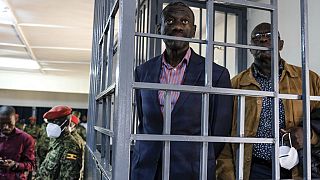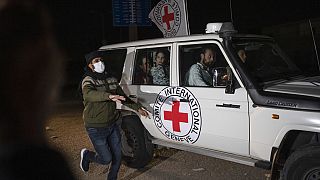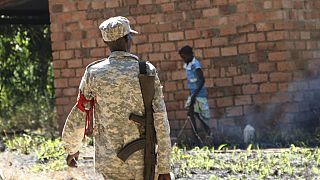Uganda
On the outskirts of the Ugandan capital Kampala lies Kasokoso, a slum that's home to more than 20,000 people. Here, women and children brace the scorching sun, hitting rocks, breaking them into smaller pieces.
This livelihood is all many have known for years, some dating back to the late 90s.
- The story of some of the workers -
Irene Anek is one of many workers to have escaped conflict in northern Uganda. With no education, she couldn't find any meaningful employment, so resorted to odd jobs for survival.
Decades later, her family is still stuck in the same cycle of poverty, crushing stones in this makeshift quarry, one of several in the area.
"Some days, we go back home with 3,000shs or 5,000shs (approx. $0.82 - $1.36 USD), depending on your energy," says Anek.
"That money is barely enough to buy food and groceries, because most times the prices are too high. So, we are just surviving, living hand to mouth."
With the COVID-19 pandemic and subsequent lockdown, Anek and other parents have had to bring their children to the quarries.
Anek's oldest son, Paul Okwir, says the closure of schools means they have to support their mother, any way they can.
"We had nothing to do, but we came here and we (found) something to do and now we can work and we can get money," he says.
"We can save and if this corona(virus) is over, we can go back to school when we have our money for paying. In a day, I can make 3,000 or 3,500 (Ugandan shillings)."
- Uganda's Housing Issue -
With Uganda's population increasing, demand for accommodation and infrastructure is also on the rise.
Construction companies often take advantage of cheap materials, like the stone produced by these workers.
But crushing stones by hand is causing serious health concerns among workers as accidents and injuries are very common here.
Nancy Akello has been working here since 2008. She says without any protective gear, many of her colleagues have been hospitalised.
"The biggest challenge with this quarrying is that it causes chest pain and other respiratory complications, due to the stone dust that we inhale," says Akello.
"We also get injuries from stone particles that enter our eyes and hitting our fingers with hammers."
-- Are there any measures to address the issue? --
Local authorities say there's little they can do to avert the danger. The quarries are often privately-owned with little or no regulation.
"Our children are even going to be spoilt because each time they are at the stone quarry, though they are sustaining the jobs, but their knowledge is now down, so that needs to be uplifted again," says Mebrah Bamwena, a community women's leader.
"You cannot leave a child to be (sat) there for three months, that means he is going to forget the studies and be on stone quarrying, that's too bad."
According to the Johns Hopkins University tally, Uganda, a country of about 42 million people, has reported over 2,600 cases of COVID-19 and more than 25 deaths.
As COVID-19 cases surge in Uganda, the danger to these people goes ignored.











01:37
Record participation at 24th Sofi Great Ethiopian Run
11:05
Africa's hight cost of climate change [Business Africa]
01:16
Kenya investigates alleged abduction in Nairobi of Uganda opposition figure
01:16
Ugandan opposition politician kidnapped and jailed, his wife says
01:17
COP29 finance talks lag as the summit reaches its halfway mark
01:38
COP29: What next for Africa's energy transition?